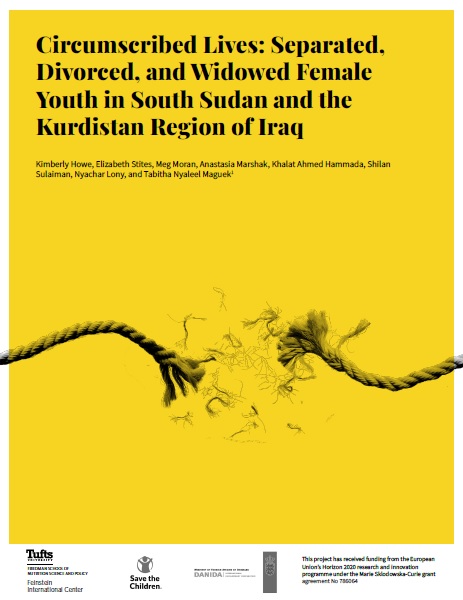Very little is known about the experiences of female youth who marry under 18 and later become separated, divorced, or widowed. This research project follows the lives of such youth who were displaced by conflict in the Kurdistan Region of Iraq (KRI) and South Sudan. This briefing paper underscores the unique vulnerabilities and challenges that separated, divorced, and widowed female youth face. These include profound mental health difficulties, economic deprivation, and social stigma and isolation. Additionally, female youth who are mothers often lose custody of their children if they are divorced or widowed. This provokes profound negative psychosocial consequences. Despite these unique hardships, humanitarian programs rarely target these special categories of female youth.
The main findings of this study include:
- Severe domestic abuse was the main cause of divorce in both country contexts. In South Sudan, an additional driver for divorce is the non-payment of bridewealth.
- In both countries, female youth are seen as responsible for the failure of their marriages regardless of the cause, provoking ruptures with their natal families and social stigma.
- Mothers who separated from or divorced their husbands can expect to lose custody of their children in both countries. Such loss provokes profound and long-lasting negative psychological consequences.
- In both countries, widows and their children face severe economic insecurity, including difficulties providing for the basic needs of their children.
- Widows in South Sudan were ‘inherited’ by their husband’s brothers to continue producing children for her in-laws. They had little to no choice in this process.
- In the KRI, widows experienced curtailment of their freedoms, and were targeted for sexual harassment, exploitation and abuse by family, community, and staff of humanitarian organizations and governments.
One in five girls is married under the age of 18 globally, and this practice likely increases during crises, including conflict, displacement, and COVID 19. While the negative repercussions on the child bride, her family, and eventual children are well-documented, little is known about the needs, challenges, opportunities, and constraints faced by female youth in displacement, including how early marriage transpires, and how lives unfold after marriage. As such, the Feinstein International Center together with Save the Children Denmark followed a cohort of displaced adolescent girls in South Sudan and the Kurdistan Region of Iraq (KRI) between the ages of 14 and 23 for 1.5 years using holistic, participatory methods.
The sample included internally displaced South Sudanese in South Sudan, and Syrian refugees and displaced Yazidis in the KRI. Research participants were unmarried, married (as minors), divorced, and widowed. Many girls in the cohort became pregnant as minors, and/or have physical, psychological, and intellectual disabilities.
The researchers conducted more than 600 interviews with more than 100 members of the cohort. This data will inform briefing papers on six topics:
- early pregnancy and sexual and reproductive health
- decision making around the practice of early marriage
- life after early marriage
- the special situation of divorced and widowed female youth
- mental health and psychological support, displacement, and early marriage
- education, displacement, and early marriage
Each paper provides cross-sectoral, concrete recommendations for humanitarian organizations seeking to prevent and respond to early marriage in fragile settings.
This project received support from Save the Children Denmark, DANIDA, Tufts University, and the European Union’s Horizon 2020 Research and Innovation Program under the Marie Sklodowska-Curie grant agreement No 786064.







